

Use Social Media in English Classes – Instagram, YouTube Channel, Cell Phone Activities. Twitter in the Classroom on CNN. Lesson Plans – Search Education – Google. Picking the right search terms Beginner Pick the best words to use in academic searching, whether students are beginning with a full question or a topic of just a few words.
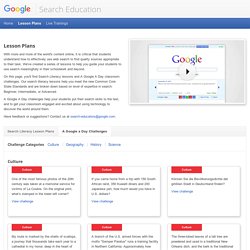
View lesson Advanced Explore "firm" and "soft" search terms, and practice using context terms to locate subject-specific collections of information on the web. Understanding search results Learn about the different parts of the results page, and about how to evaluate individual results based on cues like web addresses and snippets. Engage additional search strategies, such as generalization and specialization. Narrowing a search to get the best results Apply filtering tools and basic "operators" to narrow search results. Compare results for basic searches with ones that use operators to discover the impact the right operator has at the right time.
Searching for evidence for research tasks Evaluating credibility of sources Consider, tone, style, audience, and purpose to determine the credibility of a source. Culture. Case Studies on the Use of Online Social Networking in Formal Education. Jerome School District Best Practices: Geography and Skype - It's a Mystery! Students in Samantha Fletcher's 4th grade class are broadening their horizons beyond the four walls of their classroom.
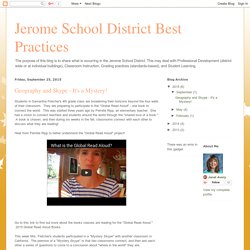
They are preparing to participate in the "Global Read Aloud" - one book to connect the world. This was started three years ago by Pernille Ripp, an elementary teacher. She had a vision to connect teachers and students around the world through the "shared love of a book. " A book is chosen, and then during six weeks in the fall, classrooms connect with each other to discuss what they are reading! Hear from Pernille Ripp to better understand the "Global Read Aloud" project! Go to this link to find out more about the books classes are reading for the "Global Read Aloud. " 2015 Global Read Aloud Books. Lesson Plan: How to use social media for social good. Social media is an important tool for learning about current events and practicing active and informed citizenship.
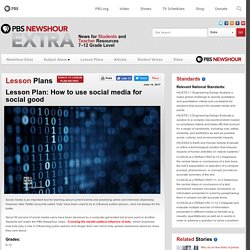
However, fake Twitter accounts called ‘bots’ have been used to try to influence public opinion—and not always for the better. Weekly Writers Blogs: Building a Reflective Community of Support. ReadWriteThink couldn't publish all of this great content without literacy experts to write and review for us.
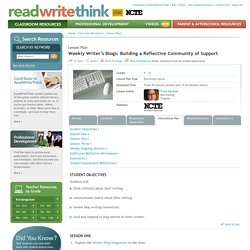
If you've got lessons plans, videos, activities, or other ideas you'd like to contribute, we'd love to hear from you. More Find the latest in professional publications, learn new techniques and strategies, and find out how you can connect with other literacy professionals. The Blog of Anne Frank?: Taking on Social Roles through Online Writing. ReadWriteThink couldn't publish all of this great content without literacy experts to write and review for us.
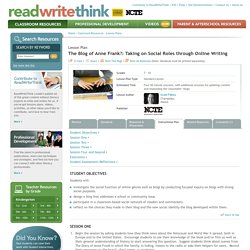
If you've got lessons plans, videos, activities, or other ideas you'd like to contribute, we'd love to hear from you. More Find the latest in professional publications, learn new techniques and strategies, and find out how you can connect with other literacy professionals. A Tale of a Few Text Messages: A Character Study of A Tale of Two Cities. Using Microblogging and Social Networking to Explore Characterization and Style. ReadWriteThink couldn't publish all of this great content without literacy experts to write and review for us.
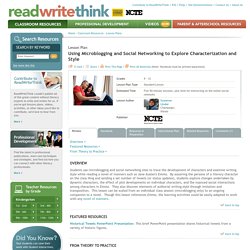
If you've got lessons plans, videos, activities, or other ideas you'd like to contribute, we'd love to hear from you. More Find the latest in professional publications, learn new techniques and strategies, and find out how you can connect with other literacy professionals. More Teacher Resources by Grade Your students can save their work with Student Interactives.
More Home › Classroom Resources › Lesson Plans Lesson Plan Overview Featured Resources From Theory to Practice Students use microblogging and social networking sites to trace the development of characters and examine writing style while reading a novel of manners such as Jane Austen's Emma.